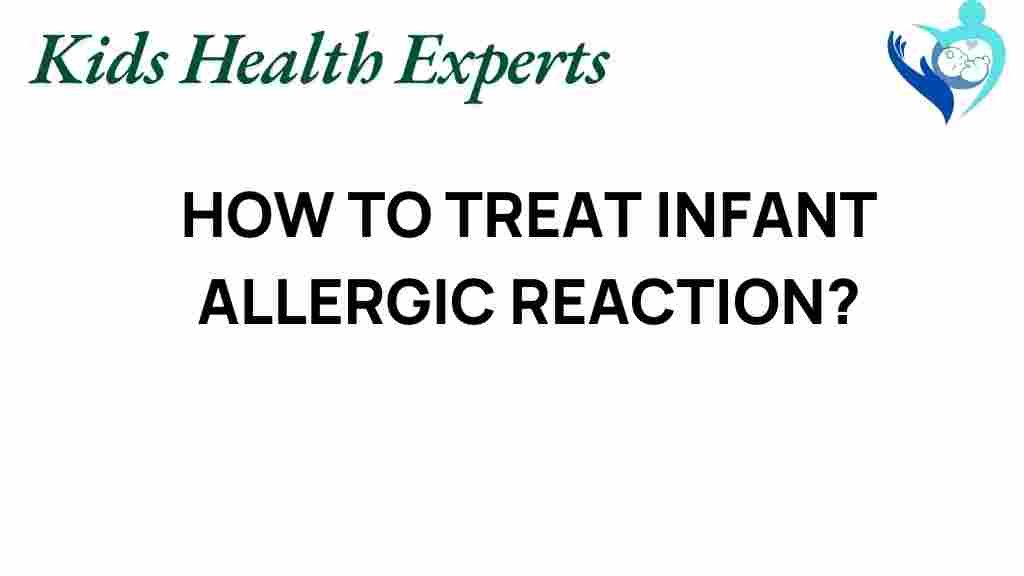As a parent or caregiver, the health and safety of your infant are of utmost importance. One area that often causes concern is the risk of infant allergic reactions. Understanding what these reactions entail, how to identify them, and the appropriate allergy treatment methods is crucial for ensuring your child’s well-being. This article provides essential insights into allergy symptoms, parental guidance, and effective emergency response strategies for managing allergies in infants.
Understanding Infant Allergic Reactions
Infant allergic reactions occur when the immune system mistakenly identifies a harmless substance as a threat. This can lead to various symptoms that can range from mild to severe. Common allergens include:
- Food (e.g., milk, eggs, peanuts)
- Environmental allergens (e.g., pollen, dust mites)
- Insect stings
- Medications
Recognizing the signs of an infant allergic reaction is essential for timely intervention. The symptoms can manifest in different ways, including:
- Skin reactions (hives, eczema)
- Respiratory issues (wheezing, difficulty breathing)
- Gastrointestinal problems (vomiting, diarrhea)
- Anaphylaxis (a severe, life-threatening reaction)
Identifying Allergy Symptoms in Infants
As parents, being vigilant about your infant’s health is crucial. Here are some common allergy symptoms to watch for:
- Skin Reactions: Redness, swelling, or hives on the skin.
- Breathing Difficulties: Coughing, wheezing, or shortness of breath.
- Digestive Issues: Colicky behavior, excessive crying post-feeding, or changes in stool consistency.
- Swelling: Swelling of the face, lips, or tongue.
If you notice any of these symptoms, it’s essential to consult with a healthcare professional for appropriate medical advice.
Step-by-Step Guide to Managing Infant Allergic Reactions
When managing an infant allergic reaction, follow these steps:
Step 1: Recognize the Symptoms
Be attentive to the signs your infant may be exhibiting. If you notice any concerning symptoms, take immediate action.
Step 2: Remove the Allergen
If you suspect a particular food or substance is causing the reaction, remove it from the infant’s environment or diet immediately.
Step 3: Administer Allergy Treatment
For mild reactions, consider the following treatments:
- Antihistamines (consult your pediatrician for appropriate dosages).
- Topical creams for skin reactions.
- Hydration and rest.
For severe reactions or anaphylaxis, use an epinephrine auto-injector if prescribed, and seek emergency medical help.
Step 4: Monitor the Infant
After administering treatment, keep a close eye on your child for any changes in their condition. If symptoms worsen, seek medical assistance immediately.
Step 5: Follow Up with a Healthcare Provider
Schedule a follow-up appointment with your pediatrician or an allergist to discuss long-term management and preventative strategies.
Emergency Response to Severe Allergic Reactions
In the case of a severe infant allergic reaction, timing is critical. Here’s what you should do:
- Call Emergency Services: If your infant shows signs of anaphylaxis (difficulty breathing, swelling, loss of consciousness), call for help immediately.
- Administer Epinephrine: If your child has a prescribed epinephrine auto-injector, use it as directed.
- Positioning: Keep your infant calm and in a comfortable position while waiting for medical help. If they are having difficulty breathing, sitting up may help.
Every second counts in an emergency, so it’s vital to be prepared and informed about the correct actions to take.
Parental Guidance: Preventing Allergic Reactions
Preventing infant allergic reactions is paramount. Here are some effective health tips:
- Introduce New Foods Gradually: When starting solids, introduce one new food at a time and wait a few days before trying another.
- Monitor for Reactions: Keep a diary of foods your infant eats and any reactions observed.
- Consult with Healthcare Providers: Get professional advice, especially if there’s a family history of allergies.
- Maintain a Clean Environment: Regularly clean your home to reduce exposure to dust mites and other allergens.
Health Tips for Infant Care
Taking care of an infant with allergies requires diligence. Here are some health tips to keep in mind:
- Educate Yourself: Learn about common allergens and allergy symptoms to better understand your infant’s needs.
- Stay Informed: Join support groups or online forums for parents of children with allergies.
- Keep Emergency Contacts Handy: Have a list of emergency contacts, including your pediatrician and nearest hospital.
Seeking Medical Advice
Always consult with a healthcare professional when you suspect an infant allergic reaction. They can provide tailored advice and testing to identify specific allergens. Additionally, they may recommend allergy testing or skin prick tests for a more accurate diagnosis.
Troubleshooting Common Concerns
Here are some common concerns parents may have regarding infant allergies and how to troubleshoot them:
Concern 1: Unexplained Skin Rashes
Skin rashes can be due to allergies, irritants, or infections. Keep track of when they appear and consult a doctor for an accurate diagnosis.
Concern 2: Persistent Digestive Issues
If your infant experiences ongoing digestive problems, it may indicate a food allergy. A healthcare provider can help determine the cause and suggest dietary changes.
Concern 3: Confusion Over Symptoms
Sometimes, symptoms can overlap with other illnesses. Document the symptoms and discuss them with your pediatrician for clarification.
Conclusion
Navigating the complexities of infant allergic reactions requires awareness, education, and preparedness. By understanding allergy symptoms, implementing preventative measures, and knowing how to respond in emergencies, you can ensure your infant’s health and safety. Always prioritize medical advice and stay informed about your child’s health needs. For further reading on allergy management, visit this resource.
Remember, as a parent, you are your child’s best advocate. Stay vigilant, be proactive, and seek help when needed.
This article is in the category Care and created by KidsHealthExperts Team
